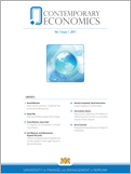The Effects of Relative Strength of USD and Overnight Policy Rate on Performance of Malaysian Stock Market – Evidence from 1980 through 2015
The Effects of Relative Strength of USD and Overnight Policy Rate on Performance of Malaysian Stock Market – Evidence from 1980 through 2015
Author(s): Abdul Razak Abdul Hadi, Eddy Tat Hiung Yap, Zalina ZainudinSubject(s): National Economy, Economic history, International relations/trade, Financial Markets
Published by: VIZJA University
Keywords: Stock Market Performance; Efficient Market Hypothesis; Macroeconomic Variables; Vector Error Correction Modeling; Johansen-Juselius cointegration test;
Summary/Abstract: The study is carried out with the objective of testing the efficient market hypothesis (EMH) at the semistrong form level. As such, the study employs two publicly available data variables – the exchange rate (RM/USD) and short-term interest rate as proxied by the overnight policy rate (OPR). The extent to which these variables influenced the performance of Bursa Malaysia (KLCI) over the past 35 years, from January 1980 to June 2015, is examined. Using monthly data, the entire study period is divided into three subperiods – the full sample period, the sample period that excludes the duration of capital control and the sample period of FBMKLCI (from July 2009 to June 2015). Deploying the Johansen-Juselius cointegration test, the study shows the presence of a long-run equilibrium relationship between KLCI and the two control variables over the full sample period and sample period, excluding the period of capital control. From the long-run regression, the effect of OPR on Bursa Malaysia is consistent over all three subperiods. This is a clear indication that the interest rate regime has a significant influence on Bursa Malaysia. Interestingly, there is no equilibrium relationship, and dynamic relationships exist between FBMKLCI and the two explanatory variables over the FBMKLCI sample period. These findings support our notion that Bursa Malaysia is unquestionably semistrong form efficient. It is now evident that FBMKLCI is the most exogenous variable of all.
Journal: Contemporary Economics
- Issue Year: 13/2019
- Issue No: 2
- Page Range: 175-186
- Page Count: 12
- Language: English

